One Health is an integrated approach that recognizes the interconnectedness of human, animal, and environmental health. Food safety plays a crucial role within this framework, as the safety and quality of food have direct impacts on human health, animal welfare, and environmental sustainability.
Therefore, to enhance awareness and promote collaboration among scientists working in several fields related to food safety, the Research group on Microbiology and Food Safety organized an workshop titled "One Health and Food Safety" on August 23rd , 2024.
The workshop aimed to highlight the relationships between food safety, animal health, environmental health, as well as their socio-economic implications. It also served as a forum for scientists to discuss ideas and present the latest researchs on food safety, and focusing on promoting sustainable development.
The workshop was attended by representatives from government agencies (Danang Department of Agriculture and Rural Development, Danang Department of Science and Technology); experts and scientists from universities (Hanoi University of Science and Technology, and University of Science and Technology of Hanoi, Vietnam National University); research institutes (Soils and Fertilizers Institute, Veterinary Institute); and various enterprises, including Yakult company, Rau Viet High-Tech Joint Stock Company, the Military Logistics Cooperative (Ministry of National Defence), and the OCOP Hoai Duc chain of stores in Hanoi and lecturers, researchers, and students from the faculties of Agronomy, Animal Science, Veterinary Medicine, and Food Technology.
In the opening address, Ass.Prof. Nguyen Thi Thanh Thuy, Head of the Microbiology and Food Safety Research group, warmly welcomed the participants. She emphasized the significance of the workshop and the vital connections between One Health principles and contemporary food safety challenges.
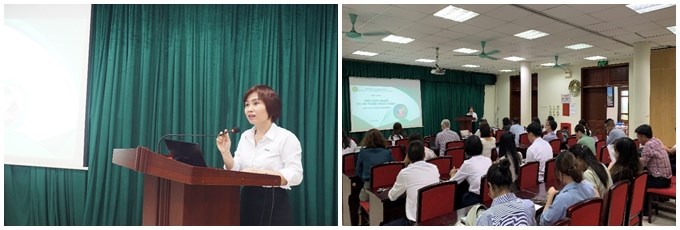
Assoc. Prof. Dr. Nguyen Thi Thanh Thuy delivered the opening speech at the workshop
At the commmence of the workshop, Dr. Nguyen Van Duy (Faculty of Animal Science) delivered a presentation titled "Supplementing of herbs to improve broiler productivity, health, and reduce environmental pollution". The current issue of antibiotic overuse in livestock farming has far-reaching consequences, including reduced livestock output and quality, environmental pollution, and the public health threat of antibiotic resistance. One promising solution to address this problem is the use of herbal supplements in animal feed. Dr. Duy’s research focused on chickens, utilizing four types of herbs—Bidens pilosa, Pseuderanthemum palatiferum (Wall.) Radlk, cinnamon, and anise - at concentrations of 1% to 2.5%.
The research discoveries revealed that supplementing chicken feed with 2% herbs significantly improved both output and quality indicators. Additionally, the herbal supplements reduced odor and emissions in chicken manure, as the herbs enhance digestion, thereby reducing the amount of excess nutrients in the waste. Moreover, the application of herbs also led to a reduction in total cholesterol and bad cholesterol (LDL) levels in the chicken meat.
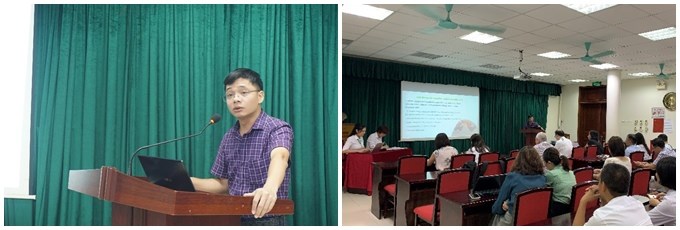
Dr. Nguyen Van Duy was presenting his topic
The following presentation "The current situation of antibiotic resistance in common pathogenic bacteria in pigs: causes, consequences, and solutions" was delivered by Dr. Dam Van Phai (Faculty of Veterinary Medicine). His presentation provided valuable insights into the complex and warning issue of antibiotic resistance in pig farming in Vietnam, which has both direct and indirect implications for human health.
Dr. Phai explained that the misuse of antibiotics - whether in terms of purpose, dosage, or type - by livestock owners has contributed to the growing prevalence of antibiotic resistance. This trend poses significant risks, not only to animal health but also to public health, as resistant bacteria can be transmitted from animals to humans. Facing the severity of the mentioned situation, Dr. Phai emphasize the urgent need for stricter regulation and management of antibiotic use in veterinary practices and livestock farming. The comprehensive data and detailed analysis of research results are helpful to assist farm owners in selecting the most appropriate medications for treating livestock diseases.

Dr. Dam Van Phai presenting his topic
Subsequent, three high-quality products were introduced through presentations. Firstly, Dr. Phan Thi Phuong Thao (Faculty of Food Science and Technology) discussed "The quality of Nam O fish sauce and its relationship with geographical conditions", highlighting the distinctiveness of Nam O fish sauce because of its specific regional characteristics. Secondly, Ass. Prof. Pham Hong Thai (Faculty of Agronomy) presented on "The quality of Gia Lai coffee honey products with certified labels" emphasizing the product’s authenticity and certified quality. Finally, Ms. Pham Thuy Linh, representing Yakult, delivered a talk on "Synbiotics reduce infectious complications after liver resection in patients with biliary tract cancer" indicating the potential health benefits of synbiotic products. Active efforts to enhance product quality, implement meticulously controlled processing methods, and advance technology in a sustainable direction all contribute significantly to advancing One Health initiatives.
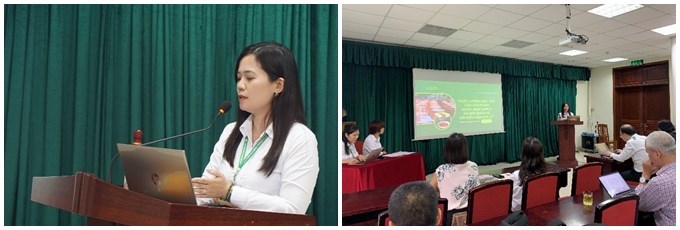
Dr. Phan Thi Phuong Thao was presenting her topic
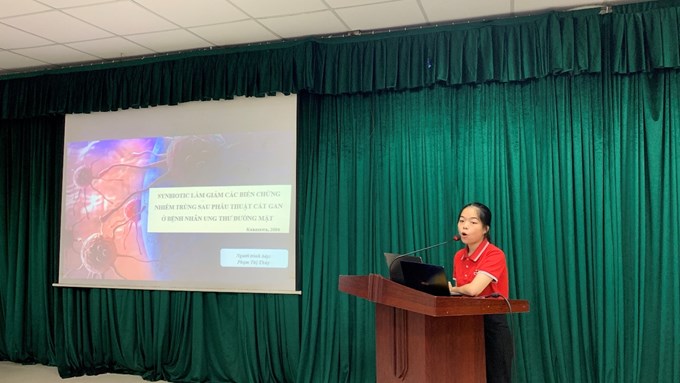
Ms. Pham Thuy Linh from Yakult company was presenting her topic
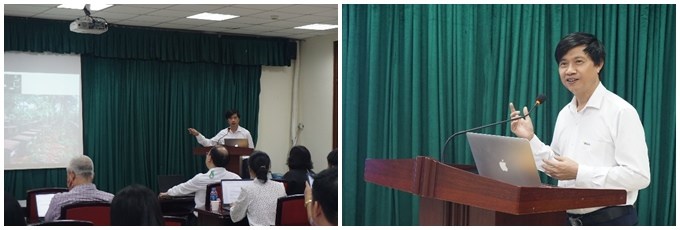
Associate Professor, Dr. Pham Hong Thai was presenting his topic
Following, food safety for traditional products was discussed by Ass.Prof. Nguyen Hoang Anh (Faculty of Food Science and Technology) through the topic "Solutions to reduce biogenic amine content in traditional fermented products". The research team presented evidence of biogenic amines in traditional products, highlighting their harmful effects and proposing methods to eliminate them, thereby enhancing the quality and value of traditional fermented products in Vietnam. These products include animal- and plant-based items such as fish sauce, fermented pork rolls, shrimp paste, soy sauce, and fermented bean curd. The proposed methods are designed to be simple, environmentally friendly, and cost-effective, optimizing the production process.
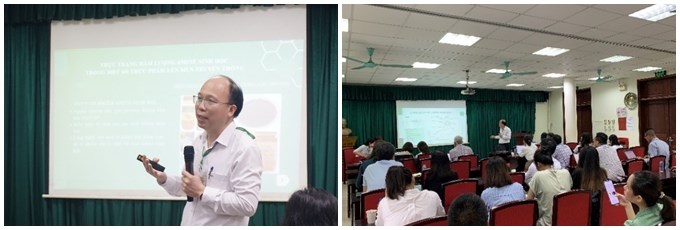
Associate Professor. Dr. Nguyen Hoang Anh is presenting his topic
Finally, to provide a comprehensive view, as well as to contribute to an overview of the impact of One Health on society, Ass.Prof. Nguyen Thi Dien (Faculty of Social Sciences) delivered the presentation "Sociology of agriculture and its applications in One Health research in Vietnam". Her presentation clarified the concept of agricultural socialization, shedding light on how it influences the understanding, consideration, and shaping of consumer behavior and practices. From a sociological perspective, food serves as an expression of individual identity, reflecting gender characteristics, economic and social status, and social relationships, all governed by culture and beliefs. Therefore, food development must be closely tied to food science while accounting for all relevant factors - technical, social, and cultural - to ensure the safety and appropriateness of food within the entire food system.
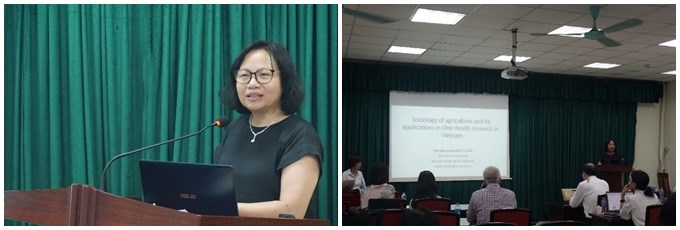
Associate Professor, Dr. Nguyen Thi Dien was presenting her topic
The workshop was well attended, and participants obtained more comprehensive understanding of the One Health concept. Despite varying definitions, the core message remains consistent: cross-sectoral collaboration, resource optimization, and respect for the autonomy of different sectors. Thereby, to enhance the effectiveness of One Health approaches, it is crucial to establish a better balance between existing sectoral groups and networks, particularly between veterinarians and human health practitioners. Additionally, there is a requirement to increase the involvement of environmental and wildlife health experts, social scientists, and development organizations.
Some other pictures at the workshop:
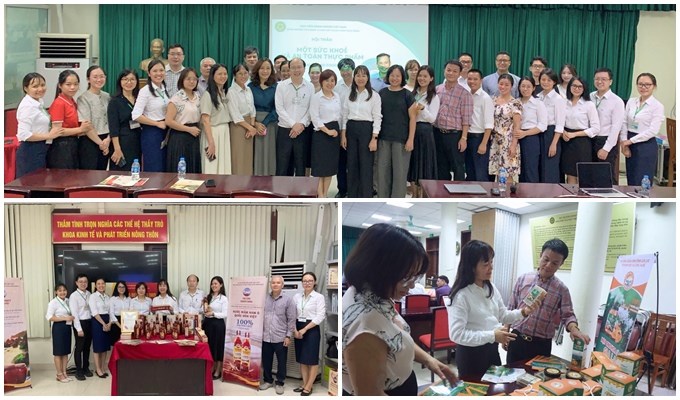
Research group of Microbiology and Food Safety